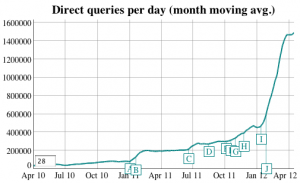If you follow technology companies closely, you know how rare it is to see that “Aha!” moment. Sometimes they fail quickly, other times they get gobbled up by a larger company or other times they simply fade away until one day you wonder what happened to them and they’ve gone.
And ever since Amybeth Hale covered Blekko when they were coming out of beta, I’ve kept my eye on what they are doing.
For one, it is interesting what they and other Google & Bing/Yahoo alternatives are doing in the market. And a little competitive pressure never hurts either. Is what we’re seeing out of Blekko (and fellow underdog rival, DuckDuckGo) a turning of a corner for these upstart search engines?
Blekko traffic up almost 400%, DuckDuckGo queries up 7.5x
First up, Blekko has seen traffic go through the roof since the first year. As Search Engine Land reports:
By the end of April, traffic to Blekko will likely have quadrupled since January 1st, and the company has a handful of reasons why it thinks that’s happening. More on the explanation later; first, the numbers.
The “slashtags” search engine has already seen a 337 percent gain in unique visitors this year. That’s as of yesterday (Monday) afternoon, and there are still two weeks left in the month.
Blekko shared the chart below from its internal analytics, showing a gain in unique IPs visiting the site from 1.58 million in December to 5.33 million so far in April.
Why has traffic increased so rapidly? Blekko CEO Rich Skrenta tells Search Engine Land that better index quality, better distribution and marketing, dissatisfaction with Google as well as the demise of Yahoo Site Explorer appear to be key factors.
 In the “I’m not sure this is coincidental” file, I bring you this chart to the left from DuckDuckGo.
In the “I’m not sure this is coincidental” file, I bring you this chart to the left from DuckDuckGo.
While it isn’t exactly an apples to apples comparison (one is measuring traffic, the other is measuring queries), make no mistake that starting around the first of the year, DuckDuckGo’s queries increased by almost 400%. Year-over-year, they’ve increased by 7.5 times. A little more than a year ago, they were pulling down sub 100,000 search days. Now they are hitting a rolling average of nearly 1.5 million searches per day.
I reached out to DuckDuckGo to see if they felt their increase in queries was attributed to the same factors Skrenta discusses but had received no word as of my deadline.
A little perspective
Congrats to both the teams at Blekko and DuckDuckGo for their recent success. Unfortunately, that isn’t the whole story.
The latest numbers from comScore indicate how great the divide is between these search engines and the largest ones out there. Even with their tremendous growth, there is still a lot of ground to make up.
For instance, one average day of Google queries in March (400 million) is almost 10 times the amount DuckDuckGo did in the entire month of March (45 million). The closest search engine in comScore’s rankings (AOL, which itself is “enhanced” by Google) had 285 million search queries. Certainly within striking distance, assuming they keep up this growth.
Why it matters to sourcers anyway
I’m a fan of the free market and competition. I’m also a big fan of Google (my web browser, search engine, e-mail and phone all are powered by Google). And while companies like Blekko and DuckDuckGo may not strike fear in a company with 12.2 billion searches a month, certainly what their rapid growth indicates is that people are out there experimenting and trying different search engines (and they aren’t all sourcers). And certainly those companies who are looking to get a leg up are looking around at what some of these successful alternatives are doing.
And as traffic increases at these alternative search engines, a couple of good things can happen:
- They will have more resources and more leverage in funding discussions so they can continue to build cool tools
- They will get more feedback about what works and what doesn’t as well as increased incentive to fix those to retain and grow
- Competitive pressures to make larger players incorporate the best of their technologies
- Possibly getting bought and incorporated into a large, very well-funded machine
Choice is a good thing. It will help push forward the way we search for people. It’s even good, at least in a certain way, for Google (they are still battling anti-trust and monopoly charges). And all of that is good for sourcers.
